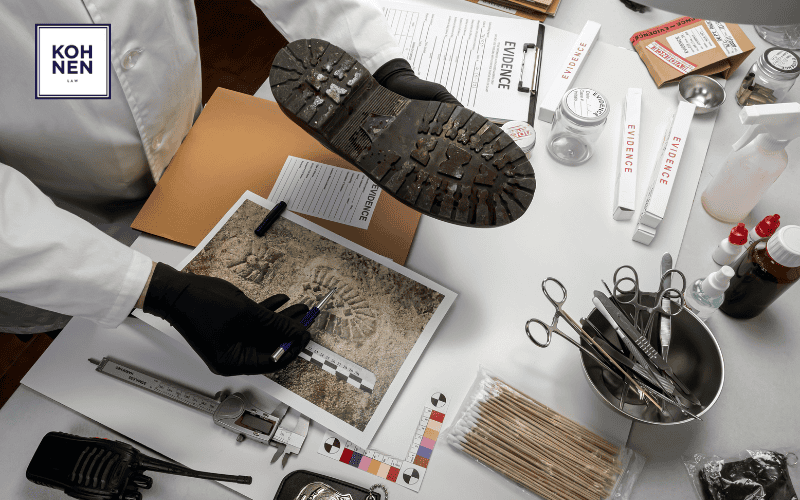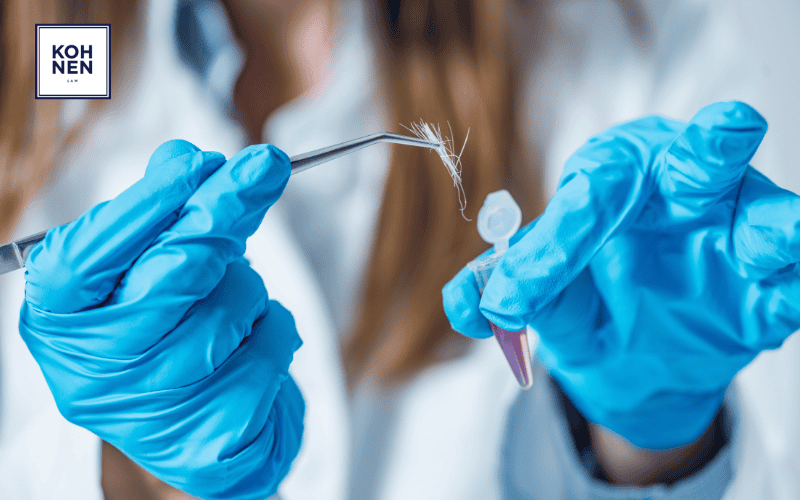
In today’s legal landscape, forensic evidence is often seen as the backbone of the prosecution’s case. Many people believe that DNA or fingerprint evidence is foolproof, but the truth is more nuanced. Forensic science, while powerful, is not infallible, and a skilled attorney understands where potential errors and biases may arise.
Forensic evidence refers to the scientific evidence that can link a suspect to a crime or clear them of suspicion. There are several types of forensic evidence commonly presented in courtrooms, each with unique collection and analysis processes.
DNA is perhaps the most well-known form of forensic evidence. By examining biological materials, such as blood, hair, or skin cells, scientists can produce a unique genetic profile. This profile can either connect a suspect to a crime scene or exonerate them.
Fingerprints are also critical in linking individuals to a crime scene. Each person has a unique fingerprint pattern, which can be matched to prints found at the crime scene.
With the rise of technology, digital forensics has become increasingly relevant. Digital data, like text messages, emails, and internet browsing history, can provide significant insights into a person’s actions and intent. In today’s digital age, cyber evidence can be as telling as physical evidence.
Forensic evidence collection is a meticulous process. In San Diego, evidence collection follows strict procedures to ensure its integrity, but even small mistakes can compromise its reliability.
San Diego law enforcement uses advanced techniques in collecting evidence, including DNA swabs, fingerprint dusting, and digital data extraction. Crime scene investigators work to preserve the scene to avoid contamination.
The proper preservation of evidence is essential. Any lapse in this process, such as improper storage or contamination, can make evidence unreliable and open to challenge in court.

DNA evidence has transformed criminal investigations, offering a seemingly irrefutable way to connect individuals to a crime scene. But while DNA is powerful, it’s not immune to error.
DNA is collected from bodily fluids, hair, and skin cells left at a crime scene. However, contamination or mishandling of samples can lead to incorrect conclusions. This is where my role as a defense attorney comes in—to examine if the evidence was handled correctly.
DNA evidence can be mishandled, contaminated, or incorrectly analyzed, leading to wrongful convictions. Knowing where to look for potential issues in the chain of custody is crucial.
Fingerprints are a common form of forensic evidence, yet they are not as infallible as many believe.
Fingerprint matching relies on identifying specific points of similarity. But the accuracy of this analysis depends on the quality of the fingerprint, the skill of the examiner, and the tools used.
Errors in fingerprint analysis can occur, particularly when prints are partial or smudged. Fingerprint analysis isn’t always definitive, and a thorough defense attorney will know where to find inconsistencies.
Digital evidence is a newer field but no less important. In cases where cyber evidence is involved, ensuring its authenticity and accuracy is paramount.
Text messages, emails, social media activity, and internet history can all be critical in court cases. However, the authenticity of this data is crucial, as digital evidence can sometimes be manipulated.
Digital evidence can tell a powerful story of someone’s actions or intentions. However, this information must be validated and presented accurately.
The handling of digital evidence is crucial to its admissibility. Poor handling can raise questions about its authenticity, which I, as an attorney, can leverage for my clients.
Not all forensic evidence is bulletproof, and my job as a defense attorney is to uncover any flaws that could lead to injustice.
From questioning the chain of custody to highlighting procedural lapses, several legal strategies can help weaken the prosecution’s forensic evidence.
The way evidence is collected can significantly impact its reliability. Evidence that isn’t gathered correctly can be deemed inadmissible, which can change the course of a case.
Even the most robust forensic methods are subject to human error. Misinterpretations or biased analysis can result in wrongful convictions, making it essential to question the accuracy of the forensic evidence presented.
Expert witnesses play a crucial role in forensic cases, providing insights into the evidence that the average person or jury may not understand.
An expert witness can either support the validity of the forensic evidence or expose its flaws. Expert testimony can add credibility to a defense and help the jury understand complex evidence.
In cases with forensic evidence, having an experienced attorney can make all the difference.
Each case requires a tailored defense strategy. Forensic evidence isn’t always as clear-cut as it seems, and understanding where evidence may fall short is essential.
As an experienced defense attorney, I know how to pinpoint weaknesses in forensic evidence and leverage them to defend my clients’ rights.
Throughout my career, I’ve successfully challenged forensic evidence in San Diego courtrooms. Whether it’s exposing mishandling of DNA or questioning the reliability of digital evidence, I’ve seen how critical a strong defense can be in complex cases.
Q1: How reliable is DNA evidence in court?
A: DNA evidence is often reliable, but contamination and improper handling can weaken its accuracy.
Q2: Can digital evidence be challenged?
A: Yes, digital evidence can be questioned, especially if the collection and handling weren’t thorough.
Q3: What should I look for in a criminal defense attorney?
A: Look for experience, especially in challenging forensic evidence, as it can make or break a case.
Q4: How are fingerprints used in criminal cases?
A: Fingerprints are matched to a database, but issues can arise if the prints are smudged or partial.
Q5: Why is expert testimony important in forensic cases?
A: Expert testimony can clarify or question the validity of forensic evidence, making it essential in many cases.

Forensic evidence can be powerful, but it isn’t always perfect. In San Diego, I’m committed to ensuring that every piece of evidence is scrutinized to uphold justice. Forensic evidence is often painted as irrefutable, but with a skilled defense, even the strongest case can be challenged.
Call us now to schedule a consultation with a criminal defense attorney in San Diego. 24-hour assistance: (619) 398-2500 or contact us online.